Living off-grid brings freedom, adventure, and the chance to create a life more connected to nature. However, it also demands a higher level of responsibility for your own health and safety. While topics like health and safety may seem unexciting, they are vital when living off-grid, where emergency help could be far away or hard to access. Taking proactive steps to protect yourself can make this lifestyle safer and more sustainable.
The off-grid lifestyle comes with unique challenges. Whether you live in a vehicle, a remote cabin, or a boat, you need to adapt to conditions that might be less predictable and less controlled than in a conventional home. By preparing for environmental factors, ensuring your living space is safe, and following practical safety measures, you can minimise risks and focus on the rewarding aspects of your off-grid journey. This article explores the essential elements of staying safe and healthy while living off-grid, from adapting to extreme weather to maintaining your home and handling emergencies.
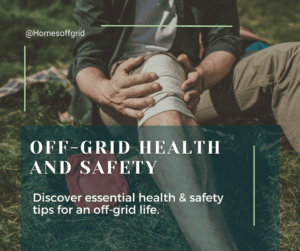
Staying Healthy Off-Grid
Maintaining health and well-being is essential when living off-grid. From adapting to environmental factors to keeping your resources unspoilt, a proactive approach is crucial for thriving in a self-sufficient environment.
Preparing for Environmental Conditions
Living off-grid means adapting to nature’s ever-changing conditions, so dressing appropriately is essential. In winter, layer your clothing to trap warmth and insulate against cold, while in summer, opt for breathable fabrics that help regulate body temperature. Adjusting your schedule to work during cooler hours – such as early mornings or late evenings – can also help you avoid the risks associated with extreme temperatures.
It’s crucial to recognise and address symptoms of weather-related health issues promptly. For example, signs of heat exhaustion include excessive sweating, dizziness, and fatigue, while dehydration may present as dry mouth, headaches, or confusion. In colder conditions, watch for hypothermia symptoms like uncontrollable shivering, slowed speech, or a sudden lack of coordination. Know when to seek help or take action to prevent these conditions from escalating.
Safe Eating Practices
Food safety becomes even more important in an off-grid setting, where limited resources may challenge conventional storage and preparation methods. Prevent animals and pests from interfering with your food supply by using secure, rodent-proof storage containers. If you rely on cold storage, monitor its temperature regularly, especially during power outages, to avoid spoilage.
Hygiene is critical in preventing foodborne illnesses. Wash produce thoroughly and cook food to appropriate temperatures to kill bacteria. However, off-grid living often encourages a practical approach to waste reduction including certain leniencies. Foods past their ‘sell by’ date may still be safe to eat if they look, smell, and taste fine – but always err on the side of caution. Any signs of discolouration, mould (except in safe cases like cheese), or sour odours should not be ignored.
Safe Drinking Practices
A reliable water supply is fundamental to both health and safety off-grid. Ensure your drinking water is free from contaminants by regularly testing, filtering, or purifying it. Various filtration systems, boiling methods, or purification tablets can help maintain a clean supply.
Storing water safely is equally important to avoid contamination. Use clean, sealed containers and check storage tanks or reservoirs regularly for debris, algae, or leaks. In hot or physically demanding conditions, staying hydrated is critical. Dehydration can sneak up quickly, so make a habit of drinking water throughout the day, even if you don’t feel thirsty.
Maintaining a Healthy Lifestyle
Sustaining a balanced lifestyle can reduce stress and help prevent injuries while living off-grid. Alternate between work and rest to avoid overexertion, which can lead to fatigue, weakened immunity, and other health complications.
Incorporate regular exercise or stretching into your routine. These activities not only improve flexibility and reduce the risk of injuries from manual labour but also promote overall physical well-being.
Mental health is just as important as physical health. Living off-grid can feel isolating at times, so it’s crucial to maintain social connections, whether through local communities or regular communication with friends and family. Set aside time for relaxation and hobbies to recharge mentally and emotionally. Managing stress effectively will make off-grid life more rewarding and sustainable in the long run.
Keeping Your Home Safe
Off-grid living requires a heightened awareness of health and safety, even around the home. Thorough maintenance and regular inspections of key systems are crucial for ensuring a secure and comfortable environment.
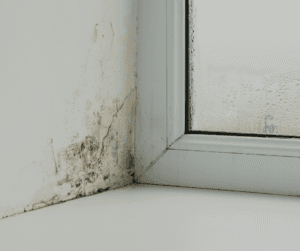
General Maintenance
A safe and comfortable off-grid home begins with regular maintenance. Structural issues such as leaks, drafts, or infestations can quickly escalate if left unchecked. Conduct routine inspections to identify and address problems early, whether it’s repairing a damaged roof, sealing gaps in walls, or reinforcing your foundation.
Mould is a common issue in off-grid homes, particularly in damp or poorly ventilated spaces. To prevent mould growth, ensure your home has adequate airflow by using ventilation systems or opening windows when weather permits. Consider investing in a dehumidifier for particularly humid climates or spaces prone to dampness. Promptly addressing leaks from rain or plumbing will also help prevent mould from taking hold.
Electrical and Gas Safety
Maintaining the safety of your electrical and gas systems is vital in any home, but especially when living off-grid. Solar systems, batteries, and wiring should be inspected regularly to catch potential faults that could lead to power outages or even fires. Check for signs of wear, corrosion, or loose connections, and replace components as needed.
Gas systems require similar attention. Periodically check for leaks, and ensure proper ventilation in confined spaces to avoid the risk of fires or carbon monoxide poisoning. For both electrical and gas systems, bringing in a qualified professional for inspections or repairs is a wise investment, even if you’re generally self-reliant. Their expertise can help identify issues you may overlook.
Carbon monoxide detectors and fire extinguishers are non-negotiable safety essentials. Install detectors in areas where gas appliances are used, and test their batteries regularly. Fire extinguishers should also be checked for expiration dates and functionality, ensuring they’re ready to use if needed. These precautions provide peace of mind and a critical layer of safety for your home.
Safe Working Practices
Safe working practices are essential in any situation but in off-grid environments where self-reliance is required they are especially important. Minimising risks through organised workspaces, proper equipment use, and careful animal handling contributes to both productivity and well-being.
Keeping Areas Clear and Accessible
Cluttered or disorganised spaces can quickly lead to accidents, especially in a working off-grid environment. Maintaining clear pathways is essential to prevent trips and falls, particularly in high-traffic areas like kitchens, workshops, or outdoor work zones. Regularly clear debris, tools, or loose materials from pathways to keep them safe and accessible.
Organised storage of tools and supplies also reduces hazards. Keep sharp or heavy items securely stored and easily reachable when needed. This practice not only minimises the risk of injury but also saves time during tasks. Alongside these efforts, staying mindful of your surroundings is key. Spatial awareness can help you avoid potential accidents, whether working with others or navigating tight spaces.
Construction and Manual Work Safety
Construction and manual labour are often integral to off-grid living, and health and safety measures should always be a priority. Wearing protective gear – such as gloves, safety glasses, sturdy boots, ear defenders and hard hats – provides essential protection during high-risk tasks. Invest in quality gear that fits well and is appropriate for the work you’re doing.
When handling tools and machinery, ensure they are well-maintained and used correctly. For example, keep blades sharp, lubricate moving parts, and follow safety guidelines for each piece of equipment. If you’re unfamiliar with specific tools, take the time to learn proper techniques or seek training before use.
Working at height, such as on roofs or ladders, demands additional precautions. Use stable, secure ladders and harnesses when necessary. Never rush tasks at height, as the consequences of a fall can be severe.
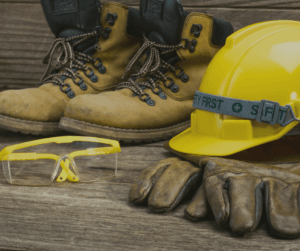
Animal Handling
Off-grid living often involves interacting with animals, whether for companionship or livestock purposes. Proper training can help reduce aggression or unpredictable behaviour in animals. Begin handling livestock from a young age to build trust, and approach new or unfamiliar animals with patience and care.
Protective clothing, such as gloves or heavy-duty boots, is invaluable when working with livestock. These barriers can prevent injuries from bites, scratches, or accidental trampling. Always keep a stocked first aid kit nearby for treating minor injuries promptly, reducing the risk of infection or complications.
Lifting and Carrying
Manual labour often involves moving heavy or awkward loads, which can strain your body if not done safely. To avoid back injuries, use proper lifting techniques: bend at the knees, keep your back straight, and lift with your legs rather than your back.
When faced with particularly heavy or bulky items, don’t hesitate to use tools such as wheelbarrows, carts, or dollies to ease the load. These aids reduce the physical strain and improve efficiency, helping you complete tasks without overexerting yourself.
Mobile-Home Specific Situations
Off-grid living encompasses a variety of environments, each demanding its own specific health and safety considerations. Mobile homes, whether boats or vehicles, present unique challenges that require careful planning and consistent maintenance to ensure safety and well-being on the move.
Boat Life
Living on a boat presents unique challenges, especially when it comes to safety and maintenance. Regular upkeep is essential to ensure the proper functioning of engines, bilge pumps, and electrical systems. Faults in these critical areas can escalate quickly, particularly on the water, where access to repairs or assistance may be limited.
Monitoring water levels and staying aware of weather changes, such as sudden storms, is a vital habit for boat dwellers. Navigation hazards, including shallow reefs at sea or submerged trees on inland waterways, require constant vigilance to avoid vessel damage. Using depth sounders or visually scanning the water can help mitigate these risks.
Maintaining reliable communication is equally important, especially when venturing out to sea. Equip your boat with a working VHF radio or satellite communication device. If something goes wrong, it could be days or even weeks before encountering another vessel that can provide assistance.
Living in a Vehicle
Vehicle-based off-grid living requires ongoing attention to mechanical systems. Regularly check critical components like brakes, tyres, and battery systems to ensure your vehicle remains roadworthy and reliable. Scheduling routine maintenance can help you catch small issues before they turn into significant problems.
Planning your routes and staying informed about road conditions is another essential aspect of mobile living. Road closures, rough terrains, or local regulations may impact your travel plans, so keeping flexible and prepared is vital. Be aware of localised driving risks – in some regions it is common to find wildlife or livestock on the road, and driving at night can often be high risk.
When selecting a park-up, consider potential risks like rockfalls, windfall trees, or flooding. For instance, avoid parking in forested areas during storms or near rivers during heavy rain. While it’s impossible to eliminate all risks, taking preventative measures can significantly reduce the likelihood of accidents.
Inside the vehicle, organise storage to prevent clutter and secure items to avoid movement while driving. Loose objects can become hazardous projectiles during sudden braking or accidents, posing serious risks to passengers. Use cabinets with locking mechanisms or bungee cords to keep everything in place.
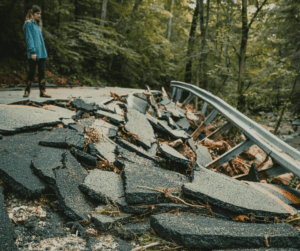
Basic First Aid and Emergency Preparedness
The isolation and independence typical of off-grid living make basic first aid knowledge an essential skill. Being prepared to handle minor injuries and stabilise more serious situations is crucial when professional medical help might be delayed. However, it is equally important to know when a situation requires outside intervention and having a plan for accessing emergency services, even in remote locations.
Essential First Aid Knowledge
When living off-grid, having the right first aid supplies and knowledge is an important step in prioritising your health and safety. It can make all the difference in managing minor injuries or stabilising serious ones until professional help arrives. Ensure your first aid kit is well-stocked and tailored to off-grid conditions. Include essentials such as bandages, antiseptics, tweezers, splints, sterile gauze, adhesive tape, and any necessary medications specific to your needs.
Learning basic first-aid techniques is equally important. For example:
- Treating cuts: Apply pressure to stop bleeding, clean the wound with antiseptic, and cover it with a sterile bandage. Elevating the affected area above the heart will help to slow blood flow.
- Treating burns: Run the burn under cool water for at least 10 minutes and cover it with a non-stick dressing.
- Managing sprains: Use the R.I.C.E. method – Rest, Ice, Compression, and Elevation – to reduce swelling and promote recovery.
Additionally, understanding how to recognise severe allergic reactions (e.g., anaphylaxis) and infections can be lifesaving. Keep antihistamines or an epinephrine auto-injector (epi-pen) if you or someone in your group is at risk of severe allergies.
Accessing Medical Care
Despite preparation, situations may arise where professional medical care is required. Keep a list of contact details for nearby medical services, such as hospitals, clinics, or emergency response teams. For those who frequently move locations, maintaining up-to-date contact information for regional services is crucial.
Plan routes to the nearest hospital or clinic from your home base, even if you live in a remote area. Familiarise yourself with the travel time and potential obstacles that could delay access. If you’re frequently on the move, ensure you have reliable ways to locate medical facilities, such as GPS devices or offline mapping apps.
Having this level of preparedness can help you stay calm and act effectively in emergencies, even in the most isolated locations.
Conclusion
Health and safety are the foundation of successful off-grid living. By integrating these practices into your daily routine, you protect yourself and ensure your lifestyle remains sustainable and enjoyable. Whether it’s regular maintenance, staying prepared for emergencies, or prioritising your physical and mental well-being, proactive steps can make a significant difference.
Living off-grid requires a keen awareness of your surroundings and the ability to assess potential risks. By staying vigilant and planning ahead, you can prevent many challenges from escalating into serious problems. Embracing these health and safety measures doesn’t detract from the adventure of off-grid living – it enhances it. By reducing risks and ensuring peace of mind, you free yourself to fully enjoy the independence, connection to nature, and simplicity that make this lifestyle so rewarding.
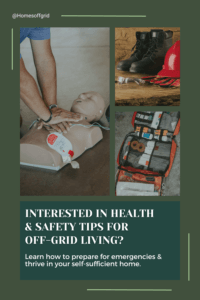
To find out more about off-grid living return to our Reading Room.


